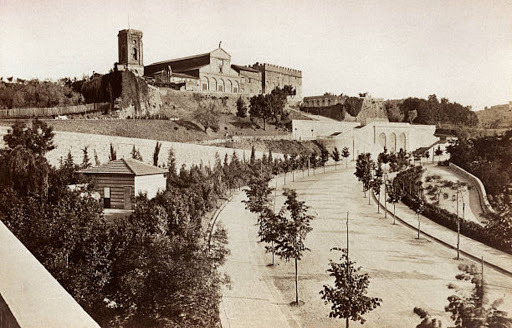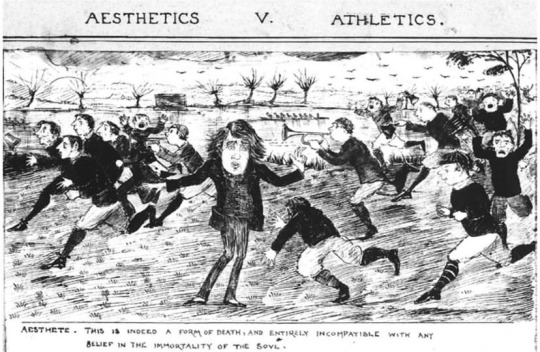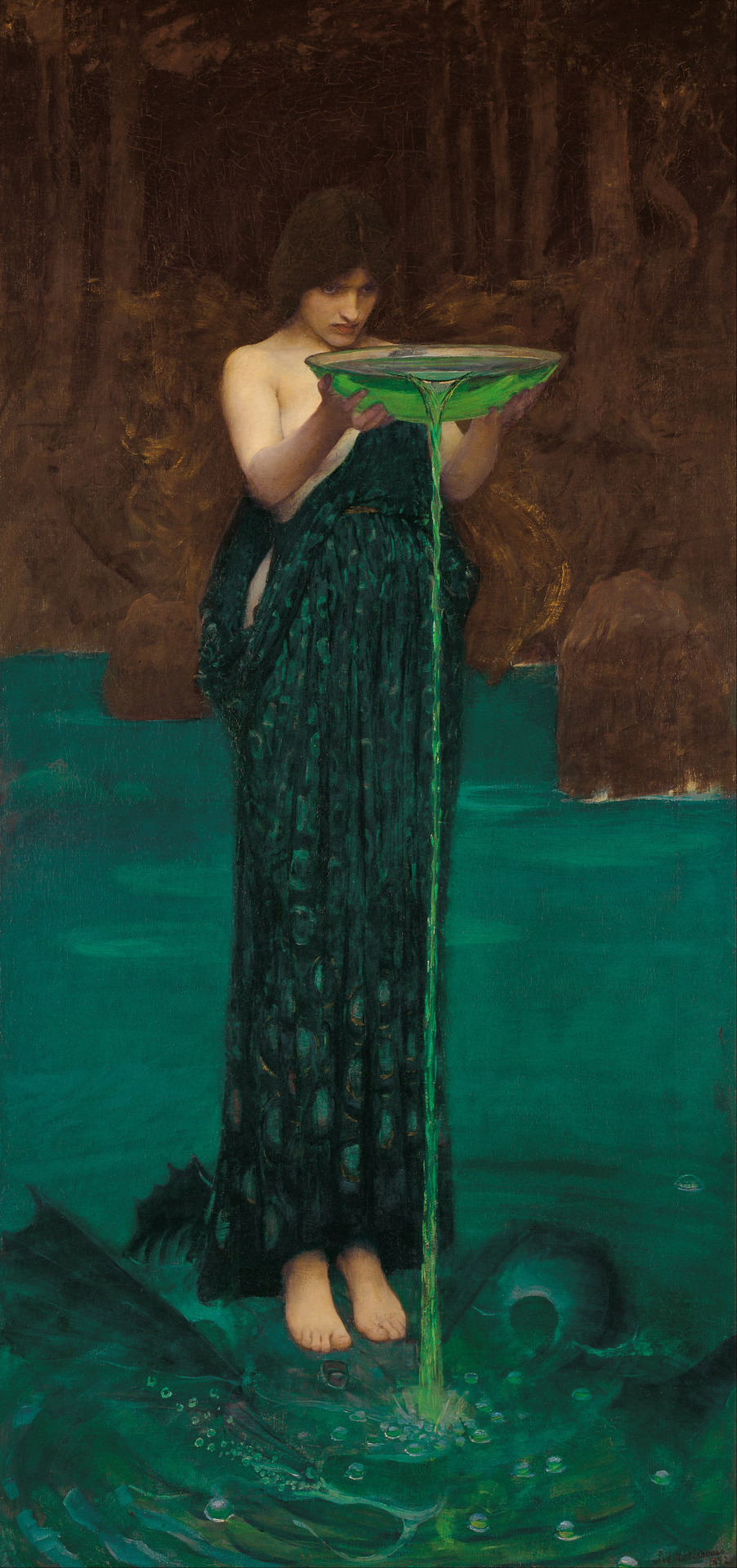Sharing aesthetic and decadent culture.Because one can never be overdressed or overeducated.
Don't wanna be here? Send us removal request.
Text

San Miniato al Monte, Florence, 1875 circa. In that year, a twenty-year-old Oscar Wilde, studying at Oxford, spent his summer holidays in Italy.
On June 15 he sent a letter to Sir William Wilde with an account of his tour of Florence: San Lorenzo and the Biblioteca Laurenziana in the morning, then the Etruscan Museum —which he is sure his father would find very much interesting, as he himself spent two hours there. Eventually, «[i]n the evening I dined at a restaurant on top of San Miniato, air delightfully clear and cool after the thunderstorm». «Mahaffy is not come yet», he adds «I do hope he will arrive today, as I shan't be able to stay much longer away.» Wilde was, indeed, to be joined in Florence by his former professor at Trinity College, Mahaffy, and a young student, William Goulding. However, out of funds, he could only follow them to Milan. He had then to head back home, deprived of the possibility of visiting Rome. The letter is signed «OSCAR O'F. WI. WILDE».
There is also a poem, titled San Miniato, which he probably wrote on the same day, June 15, showing a «battle of sacred and profane for Wilde’s soul» where «the profane is inching ahead». When the poem was published in 1876 in the Dublin University Magazine, it had been revised. In the new version, «the sacred had taken over all but the last words, and his passive tolerance of nature had given way to a desperate longing for supernatural intervention.»
SAN MINIATO
See, I have climbed the mountain-side Up to this holy house of God, Where that Angelic Monk once trod, Who saw the heavens opened wide,
And throned upon the crescent moon The Queen of heaven and of grace— Mary, could I but see thy face, Death could not come at all too soon.
•••
O! crowned by God with love and flame, O! crowned by Christ the Holy One, O! listen, ere the searching sun Show to the world my sin and shame.
According to Ellmann, at the time Oscar Wilde was seduced by the Catholic rituals («He put his own case in describing later the seductiveness of the Roman ritual for Dorian Gray»).
Sources: Ellmann, Richard. Oscar Wilde
#decadence#dublin#oxford#dark academia#english literature#fin de siècle#oscar wilde#wilde#florence#firenze#italy#dorian gray
4 notes
·
View notes
Text

This college cartoon from the time he was at Oxford mocks him for believing that athletics were "a form of death".
According to Matthew Sturgis’s biography, his inability to play any sports was already known at Portora. He would be persuaded sometimes to join his companions on an outing, but he was terrible at rowing. He once broke his arm while playing Chargers, falling from the back of another senior schoolboy, introducing him to the trauma of physical pain. At Trinity College, the atmosphere was worse: he would describe it as "barbaric" and his undergraduate peers, he said, only thought of "nothing but cricket and football, running and jumping".
Among the first surviving writings of Oscar, there is this amusing rhyme about the tricky game of cricket:
«Never more will I play
With the soaring and gay
But cruel in its fall -
The mean old cricket ball.»
And yet, this is not what his son, Vyvyan Holland, recounts in his book Son of Oscar Wilde, according to which the letters written by Oscar himself put him in a complete different light from the one people tried to put him into during his Oxford days. They do not convey the idea of the effeminate and wilting aesthete. He was passionate about art of every form, but also of healthy exercise: indeed, he wrote enthusiastically about a salmon he caught, his shooting skills, and about how good he was becoming at lawn tennis. «A thread of tremendous zest for living runs through the letters, an eagerness to enjoy every moment of life to the full.»
#decadence#dublin#oxford#dark academia#english literature#fin de siècle#oscar wilde#Wilde#dorian gray#decadent#aesthetics#aestheticism#oxford university#trinity college
9 notes
·
View notes
Text
“Art finds her own perfection within, and not outside of, herself. She is not to be judged by any external standard of resemblance. She is a veil, rather than a mirror.”
— Oscar Wilde, “The Decay of Lying”
42 notes
·
View notes
Text

Circe Invidiosa by John William Waterhouse (1892)
16K notes
·
View notes
Text

J.E. Millais, Preparatory sketch for 'Ophelia'
4K notes
·
View notes
Text

«FIRST AND FOREMOST, IRISH.»
There is a podcast produced by the University of Oxford, through which I became aware of an article in the New Yorker
written by Stephen Fry in 1997, after he announced that he had taken on the role of Oscar in the film Wilde. Stephen Fry shared some humorous fan letters he had received in his mailbox. But one of them read: «Dear Mr. Fry, I hope you don't forget that the key, the only key, to Oscar is that he was and is, first and foremost, Irish.»
Not that it would ever be possible to forget Wilde's Irishness, only that one might underestimate it. Over the years, much emphasis has been placed on Wilde's cosmopolitanism, not least because his individualism emerged as early as adolescence, until he became, to all intents and purposes, a homme du monde. He himself uses this description in one of his letters: «Français de sympathie, je suis Irlandais de race, et les Anglais m'ont condamné à parler le langage de Shakespeare.» Especially when we talk about the public figure he managed to create, Wilde was indeed a celebrity: Oxford provided him access to the English cultural scene and society, and the English society provided him with opportunities, in England and beyond.
In this regard, I found it enlightening to read his biography written by Matthew Sturgis in 2018. In the first two chapters, it dwells on Oscar's childhood spent with his parents in rural Ireland among archaeological remains and Celtic legends.* The belief of Lady Wilde that the Greeks were related to the Celts stimulated young Oscar's enthusiasm for the aesthetics of Greek culture. This is a fundamental aspect of Wilde's upbringing, whose eccentric personality stemmed from nothing more than a sense of nationalism and fascination with Irish folklore.
*Sir William Wilde built and owned houses in Bray and Cong. The family used to spend their holidays at Moytura House, on the shores of Lough Corrib, in Cong, County Mayo. Near Cong there is Moytura Conga, the site of the legendary Battle of Moytura, narrated in the Cath Maige Tuired (or The Battle of Magh Tuireadh) - two saga texts of the Mythological Cycle of Irish mythology.
#oscarwilde#findesiecle#decadence#aesthetic#aesthetics#aesthetic movement#aestheticism#englishliterature#ireland#dublin#oxforduniversity#oxford#richardellmann#stephenfry
4 notes
·
View notes